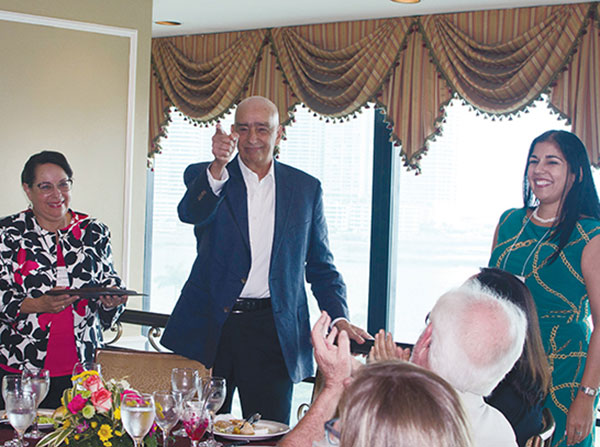
Jorge Motta, center, former director of the Gorgas Memorial Institute in Panama and National Secretary of Science, Technology and Innovation of Panama, receives the inaugural Health Equity Hero Award while Lourdes Baezconde-Garbanati, left, looks on. The award was given as part of a summit organized by the Keck School of Medicine of USC.
From the northern tip of Alaska to the southern coast of Chile, the Americas host some of the most diverse — and disparate — populations in the world. However, despite progress in medicine and economic development, health inequalities prevail, leading to avoidable premature illness and death among millions of disadvantaged people.
With a goal of reducing disparities, researchers, policymakers and civil society members spanning 13 countries gathered in Panama Oct. 7-8 for a landmark meeting. The objective: to form partnerships and promote future research and training collaborations to further health equity—people’s attainment of their highest levels of health, regardless of who they are and whatever their circumstances may be.
“We live in a time of transformation in the Americas,” said Lourdes Baezconde-Garbanati, PhD, MPH, director of the new Center for Health Equity in the Americas (CenHealth) and professor of Population and Public Health Sciences at the Keck School of Medicine of USC, which organized the conference. “Coming together to share our vision ensures that we unify efforts on behalf of health equity in some of the most vulnerable populations in the Western hemisphere.”
According to a World Health Organization report on cancer in Central and South America, poorer countries such as Bolivia and Peru see more infection-related cancers — like stomach and cervical cancers — whereas more affluent nations, such as Argentina and Brazil, experience higher incidences of so-called “lifestyle” cancers — like prostate and breast cancer.
The summit, “Promoting Health Equity and Transnational Partnerships in Cancer Prevention and Control in the America,” presented a unique opportunity: to strengthen the bonds among partners and expand reach across 13 nations in Latin America, Canada and the United States, Baezconde-Garbanati said.
“USC is uniquely positioned, both culturally and geographically, to lead this initiative,” said Rohit Varma, MD, MPH, interim dean of the Keck School and director of the USC Gayle and Edward Roski Eye Institute. “The increasing globalization of our society brings both challenges and opportunities for health care worldwide. By bringing together visionary leaders for this summit and future endeavors, CenHealth is making important progress toward worldwide access to lifesaving treatments, medications and preventive care.”
Attendees included more than 60 representatives from 38 organizations, such as ministries of health, Centers for Disease Control, National Alliance for Hispanic Health, Healthy Americas Foundation, CenHealth, University of South Florida Foundation, and the Pan American Health Organization at the World Health Organization, among others.
From USC, 11 faculty represented the Department of Population and Public Health Sciences and the USC Norris Comprehensive Cancer Center, which supports the efforts of CenHealth.
Funded by the Keck School Dean’s Office, CenHealth began in 2015 and operates out of USC’s Institute for Health Promotion and Disease Prevention Research, in the Department of Population and Public Health Sciences. The center fosters and facilitates research, training and partnerships to advance health equity in the Americas.
In Panama, 39 talks covered the state of cancer as well as risks, opportunities, challenges and emerging issues related to tobacco, vaccines, HPV, migrant and indigenous populations, obesity, and environmental and occupational risk factors.
Participants worked together to present state-of-the art findings and develop a strategic plan for research, government-community collaboration, training and mentorship of the next generation of scientists in cancer prevention and control.
The plan will help guide the direction of health equity in the Americas at the civic, government and academic levels. CenHealth will publish the results on its website in November.
Looking ahead, the path toward health equity will be challenging — especially considering the sensitive political climate surrounding immigration, said Maryann Pentz, PhD, co-director of CenHealth, professor of Population and Public Health Sciences and Sidney R. Garfield Chair in Health Sciences.
In a presentation about obesity prevention and control along the U.S.-Mexico border, UC San Diego professor John Elder, PhD, said, “You can build fences, but you cannot stop the spread of culture.”
And as new public health threats like Zika virus emerge, regional collaboration and partnerships are more important than ever, said Jonathan Samet, MD, MS, Flora L. Thornton Chair of the Department of Population and Public Health Sciences at USC and director of the USC Institute for Global Health.
“With globalization and the advent of great scientific advances, such as the HPV vaccine — coupled with our strengthened relationships following this summit — we now have the tools and the reach to make a difference,” Baezconde-Garbanati said.
by Larissa Puro